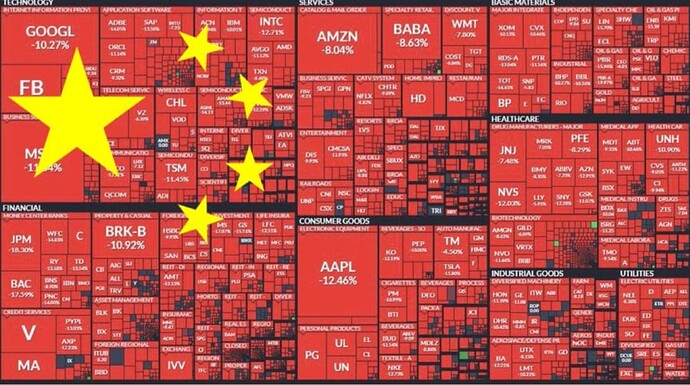Yeah litten, I have enough headaches from these exams while mom is turning on her TV as is
me raising my hand and then slowly lowering it as somebody else answers the question
Yippee
It’s more that it may signal the beginning of the end for the cycle of expanding data centers and buying more chips to build a better model. A better model being built in absence of that and for the price that wouldn’t cover the annual salary of many individuals in the domestic market may make investors wonder what the fuck they’re paying for. Nvidia’s stock crumbling was inevitable for any number of reasons though. A matter of when not if. Companies like Google and Microsoft were already working on designing their own chips so they don’t have to give money to Nvidia lol
no and where would i even hear about it
dumb bitch professor
Anyway in other economic news, the housing markets in Canada and China both seem like they’re primed to collapse. Like buying property in Canada rn seems like an insane proposition. Interest rates climbing have lead to some mortgages being extended to line 70 years so the interest rate doesn’t on the mortgage can stay the same, and all done so the current party is not the one who takes the blame of it all coming crashing down.
yea
I wonder if decentralization somewhat similar to the swiss model would help combat those dumb political games
considering the swiss model is subject to the game as much as anywhere else in the imperial core, i doubt it
(specifically videogames) (i am arguing facetiously league of legends is an rpg)
- Second Life (VR)
- Picross (DS)
- Sharktale (Gameboy) (the movie)
- settings app (3DS)
- I am a teacher super mario sweater (NES)
- Poker (gambling real money just virtually)
- Wii Music
- Wii Chess
- Final Fantasy 7
- Other
0 voters
Well, it has to do with a combination of factors (ones that are similar to or even more or less the same as the ones that lead to the US housing crash of 2008). People want to own a home, but housing prices continue to climb faster than income has (this has been true in the US for at least the last decade and in Canada it’s been several decades). As housing prices continue to rise relative to income, they become unaffordable by an increasing percentage of the population which leads to issues. Instead of combating the rise of housing prices, the government started using taxpayer money to back mortgages so lenders could pretty much guarantee a return if they just gave out more mortgages. The availability of mortgages and low interest rates increased the demand for housing (more people could now buy) which in turn increased the pricing but because the mortgages were backed by the government, this didn’t really do anything to curb the demand and the equilibrium is much higher than it should be. People viewed homes as investments, part of their retirement, rather than places to live, so it was politically valuable to keep housing prices not only stable but going ever upwards.
This is not sustainable, but could be ignored in the short term as long as interest rates were low because payments would stay more or less the same. If monthly payments start going up, that can cause people to want to downsize immediately (flooding the market with way too many homes, collapsing the price, and probably the entire market), and if that happens then many home owners may just stop paying. They’ll stop paying rather than even trying to sell because the price has gone down so much that selling the home would still leave them owing money on the mortgage so they’re still in debt and can’t even afford to downsize. They can’t pay, they can’t downsize, so they do neither. That’s bad.
So anyway, the interest rates have been going up which means that payments would normally go up, but the Canadian legislature changed the rules so the length of the mortgage would just increase to keep payments the same in order to prevent a collapse. This is just stalling.
In China, my understanding is they’ve just over built the shit out of homes. Like the whole system was predicated on future growth to make sense, but now that their population curve has plateaued, the growths stopped which is catching up to them. Their youth unemployment situation is also pretty disastrous from what I understand. I also think China has stopped publishing data related to either of those which is very funny, but also portends bad times ahead.
Funnily enough, the US also has a problem of a lot of its development only makes sense in the short term when you assume continued exponential growth. Suburban sprawl just does not make sense economically. The long term cost of the infrastructure just fundamentally does not make sense with expected returns because the tax revenue density is too low. There are towns where the maintenance costs would require taxing residents over 100% of their income lol. The US isn’t the only country to have done this either, but yeah kinda bleak thinking about how much of the world is structured in a Ponzi scheme esque way where the moment growth slows, the whole thing just busts.
Anyway, the solution to many housing woes is increasing density and allowing for more mixed use zoning. And by more density I mean more high density housing (e.g. apartments) but more middle density housing (e.g. duplexes). The issue with that is frequently cars, specifically parking. Like if you built an apartment building on top of a grocery store, most cities would require more square footage of parking than that building itself or something insane. You can’t increase density in many places (currently) because there wouldn’t be any place to park cars. This means there also has to be a huge investment in public transportation and reprioritization for walkability at the same time. It’s a huge Gordian knot of problems that is also politically difficult to execute on because of NIMBYs and these billion dollar industries (oil and automakers) that would fight these sorts of initiatives if they ever took off at scale because it would hurt their profits significantly if people suddenly didn’t have to buy cars in a lot of places.
Tl;Dr: build more housing and specifically denser housing in denser areas that don’t require parking to be built and don’t require a car to live in, and you’ll get much more long term stability.
you have to do i am a teacher super mario sweater that game is the funniest shit
I’m a bit fatigued from exams sorry for my lack of comprehension. So what I understand is that canadians have to pay for their mortgage of which the state benefits from, but the moment they stop paying the money reserve spirals into severe debt creating economic instanbility hell?
I think when it comes to China, so basically they have alot of ghost towns, there’s real estate built but there’s no people living in there because it’s unsustainble (I think USA also has unlived ghost towns), they even have city-copies of Paris and London but nobody lives there. To my understanding, building somehow increases GDP, but I did not understand how it does and also how it would benefit the Chinese government in this case.
When it comes to the infamous car-centric architecture, yeah I think I’ve heard from passing youtube video essays how those are horrible. I follow a British youtuber and there was once talks of a car-free city model where everything you need is at walking length to you and it’s not required for you to hop into a car and presumably relying alot on high speed rail trains that exist in China and Japan for far-away cities.
Hopping back on topic with real estate, I think there’s predatory companies that buy out properties to then rent them out to people? I think Blackrock does this? And if these companies get in trouble, they’d beg the government for a bail-out for the company or the bank financing them? The lore is lost on me here sadly.
you knew that off the top of your head
Only day BRK-B drops double digits is when Buffett dies.
how old is he now?
94.
shorting BKB-B brb

